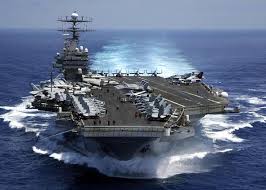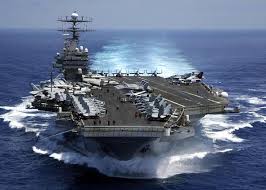
As nations in the region stepped up diplomatic talks to defuse a brewing crisis over Kim Jong Un’s nuclear program, the U.S. and North Korea both showed off their military prowess on Tuesday.
U.S. Naval Forces Korea said in a statement that the South Korean port of Busan saw that arrivals of the nuclear-powered USS Michigan, one of four Ohio-class guided-missile submarines capable of launching cruise missiles. It had no plans for a joint military drill with the submarine, South Korea’s navy said.
South Korea’s defense ministry was prompted to monitor developments in the area after Kim attended North Korea’s largest-ever live-fire artillery exercise east of Pyongyang, reported Yonhap News. There are reports that North Korea may seek to mark the anniversary of the Korean People’s Army with its sixth nuclear test and the report comes amid such expectations.
The U.S. military has an aircraft carrier near the Korean Peninsula even as it described the submarine’s visit as part of routine patrols in the Asia-Pacific region. the U.S. Seventh Fleet said in a statement that in nearby waters on Tuesday and Wednesday, the navy is conducting exercises with counterparts from South Korea and Japan. The U.S. was sending an “armada” to the region, Trump said this month.
Including through sanctions and cooperation with China, continuing with the strategy of pressuring Kim’s regime to give up its nuclear program was agreed upon by envoys on North Korean affairs from the U.S., Japan and South Korea on Tuesday.
The envoys agreed “to maximize pressure against North Korea by taking punitive measures that are hard to endure through a UN Security Council resolution and separate measures by the three countries if it persists with its provocations,” South Korean foreign ministry spokesman Cho June-hyuck said in a briefing on the meeting.
“China has a very, very important role to play” to convince its neighbor to abandon its nuclear program,” said Joseph Yun, the U.S. special representative for North Korea policy, told reporters in Tokyo. they also discussed the need for Russia’s cooperation on the issue, South Korean envoy Kim Hong-kyun said.
By emphasizing diplomacy, China has sought to calm tensions on the Korean Peninsula. According to state broadcaster China Central Television, Xi urged all parties to work within the framework of UN Security Council resolutions and to avoid actions that might make the situation worse, while speaking by phone with Trump on Monday.
North Korea stands to lose the most in a conflict, said The Global Times, a Chinese Communist Party-affiliated newspaper known for its nationalist views.
“The game of chicken between Washington and Pyongyang has come to a breaking point,” the newspaper wrote in an editorial published Tuesday. “If North Korea carries out a sixth nuclear test as expected, it is more likely than ever that the situation will cross the point of no return. All stakeholders will bear the consequences, with Pyongyang sure to suffer the greatest losses.”
Saying the situation on the Korean Peninsula was “complex and sensitive,” China’s foreign ministry spokesman Geng Shuang again called for restraint on Tuesday.
(Source:www.bloomberg.com)
U.S. Naval Forces Korea said in a statement that the South Korean port of Busan saw that arrivals of the nuclear-powered USS Michigan, one of four Ohio-class guided-missile submarines capable of launching cruise missiles. It had no plans for a joint military drill with the submarine, South Korea’s navy said.
South Korea’s defense ministry was prompted to monitor developments in the area after Kim attended North Korea’s largest-ever live-fire artillery exercise east of Pyongyang, reported Yonhap News. There are reports that North Korea may seek to mark the anniversary of the Korean People’s Army with its sixth nuclear test and the report comes amid such expectations.
The U.S. military has an aircraft carrier near the Korean Peninsula even as it described the submarine’s visit as part of routine patrols in the Asia-Pacific region. the U.S. Seventh Fleet said in a statement that in nearby waters on Tuesday and Wednesday, the navy is conducting exercises with counterparts from South Korea and Japan. The U.S. was sending an “armada” to the region, Trump said this month.
Including through sanctions and cooperation with China, continuing with the strategy of pressuring Kim’s regime to give up its nuclear program was agreed upon by envoys on North Korean affairs from the U.S., Japan and South Korea on Tuesday.
The envoys agreed “to maximize pressure against North Korea by taking punitive measures that are hard to endure through a UN Security Council resolution and separate measures by the three countries if it persists with its provocations,” South Korean foreign ministry spokesman Cho June-hyuck said in a briefing on the meeting.
“China has a very, very important role to play” to convince its neighbor to abandon its nuclear program,” said Joseph Yun, the U.S. special representative for North Korea policy, told reporters in Tokyo. they also discussed the need for Russia’s cooperation on the issue, South Korean envoy Kim Hong-kyun said.
By emphasizing diplomacy, China has sought to calm tensions on the Korean Peninsula. According to state broadcaster China Central Television, Xi urged all parties to work within the framework of UN Security Council resolutions and to avoid actions that might make the situation worse, while speaking by phone with Trump on Monday.
North Korea stands to lose the most in a conflict, said The Global Times, a Chinese Communist Party-affiliated newspaper known for its nationalist views.
“The game of chicken between Washington and Pyongyang has come to a breaking point,” the newspaper wrote in an editorial published Tuesday. “If North Korea carries out a sixth nuclear test as expected, it is more likely than ever that the situation will cross the point of no return. All stakeholders will bear the consequences, with Pyongyang sure to suffer the greatest losses.”
Saying the situation on the Korean Peninsula was “complex and sensitive,” China’s foreign ministry spokesman Geng Shuang again called for restraint on Tuesday.
(Source:www.bloomberg.com)





